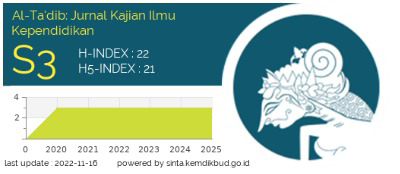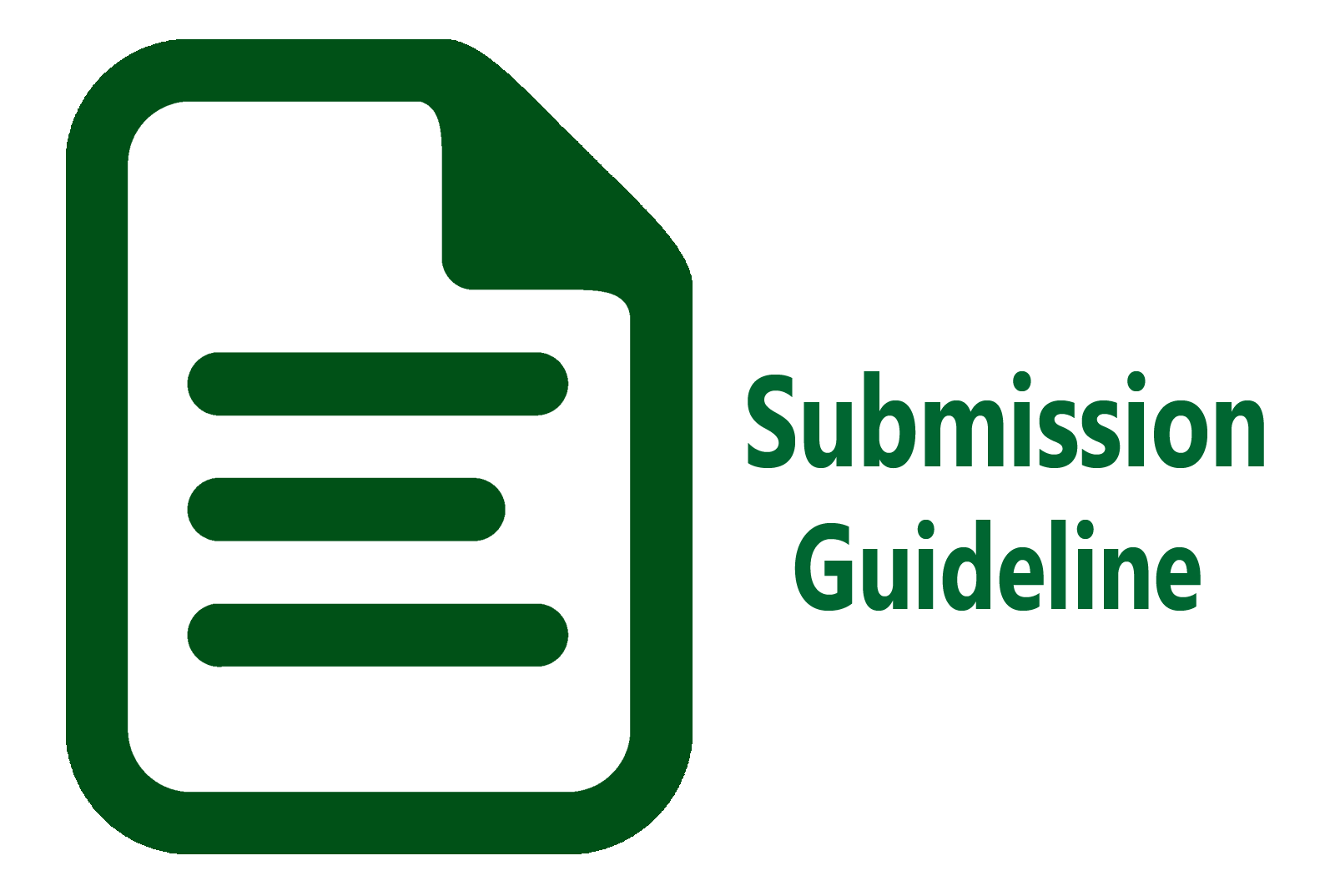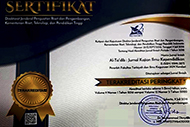The Influence of Professional Competence, Organization Support, and Task Commitment toward English Teacher Performance
Abstract
The aims of this research are to investigate the influence of positive the direct effect of professional competence, organizational support, and task commitment on the English teacher's performance of SMP and MTs in Kendari. The research applied a survey method with a quantitative approach. The data are collected from 95 English teachers who are selected randomly. The collected data are analyzed by using path analysis. The research results indicate that there is a direct influence of positive professional competence, organizational support, and task commitment on the economic teacher's performance. Also, there is a direct influence of the positive professional competence, organizational support towards the task commitment, and a direct influence of the positive professional competence toward the organization support.
Keywords: Organizational support; performance; professional competence; task commitment
Full Text:
PDFReferences
Abdirahman, H. I. H., Najeemdeen, I. S., Abidemi, B. T., & Ahmad, R. B. (2018). The relationship between job satisfaction, work-life balance and organizational commitment on employee performance. Academic Journal of Economic Studies, 4(3), 12-17.
Ahmed, F., Hassan, A., Ayub, M. U., & Klimoski, R. J. (2018). High commitment work system and innovative work behavior: The mediating role of knowledge sharing. Pakistan Journal of Commerce and Social Sciences (PJCSS), 12(1), 29-51.
Axley, L. (2008). Competency: A concept analysis. Nursing Forum, 43(4), 214-222.
Boon, H. J. (2011). Raising the bar: ethics education for quality teachers. Australian Journal of Teacher Education, 36(7), 76-93.
Chandrasekar, K. (2011). Workplace environment and its impact on organisational performance in public sector organisations. International Journal of Enterprise Computing and Business Systems, 1(1), 1-19.
Chapman, C., Muijs, D., Reynolds, D., Sammons, P., & Teddlie, C. (Eds.). (2013). The Routledge international handbook of educational effectiveness and improvement. Routledge.
Chun, J. S., Shin, Y., Choi, J. N., & Kim, M. S. (2013). How does corporate ethics contribute to firm financial performance? The mediating role of collective organizational commitment and organizational citizenship behavior. Journal of Management, 39(4), 853-877.
Eisenberger, R., Malone, G. P., & Presson, W. D. (2016). Optimizing perceived organizational support to enhance employee engagement. Society for Human Resource Management and Society for Industrial and Organizational Psychology, 2, 3-22.
Esra, N. Ç. (2010). The impact of strategic human resource management on organizational performance. Journal of Naval Science and Engineering, 6(2), 100-116.
Fouad, N. A., Grus, C. L., Hatcher, R. L., Kaslow, N. J., Hutchings, P. S., Madson, M. B., Collins, F. L. Jr., & Crossman, R. E. (2009). Competency benchmarks: A model for understanding and measuring competence in professional psychology across training levels. Training and Education in Professional Psychology, 3(4S), S5-S26.
Jung, J., & Shin, J. C. (2015). Administrative staff members’ job competency and their job satisfaction in a Korean research university. Studies in Higher Education, 40(5), 881-901.
Kunter, M., Klusmann, U., Baumert, J., Richter, D., Voss, T., & Hachfeld, A. (2013). Professional competence of teachers: Effects on instructional quality and student development. Journal of Educational Psychology, 105(3), 805-820.
Kurtessis, J. N., Eisenberger, R., Ford, M. T., Buffardi, L. C., Stewart, K. A., & Adis, C. S. (2017). Perceived organizational support: A meta-analytic evaluation of organizational support theory. Journal of Management, 43(6), 1854-1884.
Liakopoulou, M. (2011). The professional competence of teachers: Which qualities, attitudes, skills and knowledge contribute to a teacher’s effectiveness. International Journal of Humanities and Social Science, 1(21), 66-78.
Leithwood, K., & Jantzi, D. (2005). Transformational leadership. The Essentials of School Leadership, 31-43.
Luthans, F., Luthans, B. C., & Luthans, K. W. (2021). Organizational behavior: An evidence-based approach (Fourteenth Edition). IAP.
Mathis, R. L., Jackson, J. H., Valentine, S. R., & Meglich, P. (2016). Human resource management. Cengage Learning.
Meyer, J. P., & Allen, N. J. (1991). A three-component model conceptualization of organizational commitment. Human Resource Management Review, 1, 61-89.
Nangle, D. W., Grover, R. L., Holleb, L. J., Cassano, M., & Fales, J. (2010). Defining competence and identifying target skills. Dalam D. W. Nangle, D. J. Hansen, C. A. Erdley, dan P. J. Norton, Practitioner's guide to empirically based measures of social skills (hal. 3-19). New York, NY: Springer.
Onn, C. Y., & Lung, C. K. (2014). Supervisory support, organizational justice and perceived organizational support: A review and research agenda. Information Management and Business Review, 6(5), 255-260.
Rafiei, M., Amini, M., & Foroozandeh, N. (2014). Studying the impact of the organizational commitment on the job performance. Management Science Letters, 4(8), 1841-1848.
Rhoades, L., & Eisenberger, R. (2002). Perceived organizational support: A review of the literature. Journal of Applied Psychology, 87(4), 698-714.
Rode, J. C., Huang, X., & Flynn, B. (2016). A cross‐cultural examination of the relationships among human resource management practices and organisational commitment: An institutional collectivism perspective. Human Resource Management Journal, 26(4), 471-489.
Saavedra, A. R., & Opfer, V. D. (2012). Teaching and learning 21st century skills: Lessons from the learning sciences. A Global Cities Education Network Report. New York, Asia Society, 10.
Saputra, A. (2018). Allocation of education budget in Indonesia. Budapest International Research and Critics Institute (BIRCI-Journal): Humanities and Social Sciences, 1(2), 141-147.
Sukrapi, M., Muljono, P., & Purnaningsih, N. (2014). The relationship between professional competence and work motivation with the elementary school teacher performance. Asian Journal of Humanities and Social Studies, 2(5), 689-694.
Wagner, J. A., & Hollenbeck, J. R. (2020). Organizational behavior: Securing competitive advantage. Routledge.
Westera, W. (2001). Competences in education: A confusion of tongues. Journal of Curriculum Studies, 33(1), 75-88.
Zaman, K., Javaid, N., Arshad, A., & Bibi, S. (2012). Impact of internal marketing on market orientation and business performance. International Journal of Business and Social Science, 3(12), 76-87.
Zeinabadi, H. (2010). Job satisfaction and organizational commitment as antecedents of organizational citizenship behavior (OCB) of teachers. Procedia-Social and Behavioral Sciences, 5, 998-1003.
DOI: http://dx.doi.org/10.31332/atdbwv15i1.1930
Refbacks
- There are currently no refbacks.
Copyright (c) 2022 akib - -

This work is licensed under a Creative Commons Attribution-NonCommercial-ShareAlike 4.0 International License.
| Indexing: |










